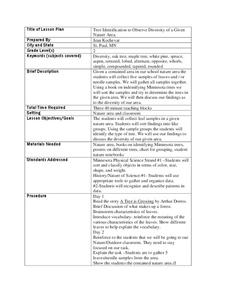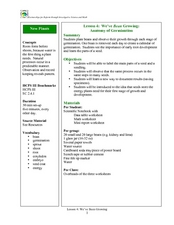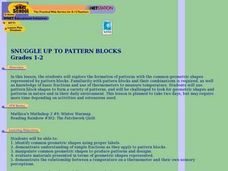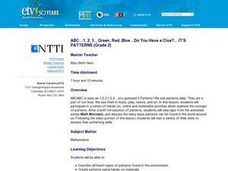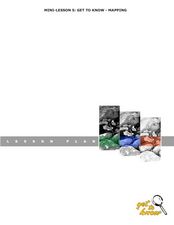Curated OER
Representing and Extending Patterns
Young scholars explore repeating and growing patterns. In this patterns lesson, students describe patterns, explore changing patterns and match patterns. Young scholars participate in online activities and read books that show...
Curated OER
Life Cycle of Trees
Turn your students into young tree-tectives with this fun science investigation into the life of trees. To begin, a class volunteer gets dressed up in a tree costume as the different parts of trees are introduced. Then, the class...
Virginia Department of Education
Weather Patterns and Seasonal Changes
Get your class outside to observe their surroundings with a lesson highlighting weather patterns and seasonal changes. First, learners take a weather walk to survey how the weather affects animals, people, plants, and trees during...
Curated OER
Tree Identification to Observe Diversity of a Given Nature Area
For this tree identification lesson, 2nd graders read A Tree is Growing, discuss what makes up a forest, brainstorm characteristics of leaves, gather samples of leaves and examine their samples. Students will sort leaves and compare them...
Captain Planet Foundation
Rotting Away
What happens at the end of a plant's life cycle? Show kids the natural way that plants show that they're decomposing, as well as the importance of compost, with a lesson about living organisms. After reading Log Cabin by Anne Schreiber,...
Curated OER
We’ve Bean Growing: Anatomy of Germination
Students identify the main parts of a seed. For this biology lesson, students explain the factors needed for the seed to grow. They record observations everyday and report findings to class.
Curated OER
Alternative Snowflakes
Students discover how snowflakes in nature are really formed, and recreate this process with paper and glue.
Curated OER
Snuggle Up To Pattern Blocks
Students view and discuss a video about the use of pattern block shapes to form pictures. They, in groups, form garden and quilt designs using pattern blocks and then decorate the room with their art.
Curated OER
From Caterpiller to Butterfly: Cycles, Circles, and Patterns
Students examine art of butterflies and discuss what they know about the insect. They create their own butterfly puppets and write a story to represent its life cycle.
Curated OER
Dream! (Part One)
Students share with the class what they want to be when they grow up. As a class, they identify what they want to be for Halloween as well. They are videotaped stating their dream and photographed with their mask. Using the masks, they...
Curated OER
Comparing and Contrasting
Students practice compare and contrast skills. In this science and language development lesson, students complete a T chart generating traits of a snail and a clam. Students complete a related worksheet.
Curated OER
ABC...1, 2, 3...Green, Red, Blue...Do You Have a Clue?... IT'S PATTERNS
Second graders view clips from the animated series Math Monsters, and discuss the many ways patterns can be found in the world around us. Following the video portion of the lesson, 2nd graders visit a variety of Web sites to assess their...
Curated OER
Mini - Lesson #5: Get To Know - Mapping
Students examine and draw landscape maps. In this mapping lesson, students investigate what a landscape map is. They draw a map showing objects on a small piece of natural landscape. Students fill in a grid sheet and a worksheet to make...
Curated OER
A Seed Dispersal Investigation
Students investigate the function and purpose of seed dispersal. In this garden lesson plan, students examine the importance of wind in the plant cycle. Students construct a flying seed model from an attached design and discuss if it can...
Curated OER
Pecan Fingerprints
Students investigate the traits that make them individuals. They study that natural items have traits that make them unique by looking at pecans. They make fingerprint animals which they use to design fingerprint cards.
Curated OER
Plants
Second graders examine the characteristics of plants. As a class, they brainstorm a list of items plants need in order to survive. In groups, they complete various experiments in which they discover the functions of the parts of the plant.



